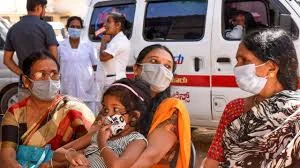 India today reported the highest single-day COVID-19 case count globally, with over 332,000 new infections recorded in the last 24 hours. This new milestone marks the most severe day in India’s ongoing second wave of the pandemic, putting immense strain on the country’s healthcare system.
India today reported the highest single-day COVID-19 case count globally, with over 332,000 new infections recorded in the last 24 hours. This new milestone marks the most severe day in India’s ongoing second wave of the pandemic, putting immense strain on the country’s healthcare system.
Hospitals across the country, especially in states like Maharashtra and Delhi, are overwhelmed, with many running out of beds, oxygen supplies, and critical medical equipment. As COVID-19 patients continue to flood emergency rooms, doctors and healthcare workers are sounding the alarm, warning that the system is on the verge of collapse. Some hospitals have reported patients dying due to a lack of oxygen, prompting an urgent appeal for supplies from both domestic and international sources.
The surge in cases is being driven largely by the B.1.617 variant, also known as the “double mutant” variant, which was first detected in India. The variant is believed to be more transmissible, raising concerns about the speed at which infections are spreading. Indian health authorities are also worried about the potential for the virus to mutate further.
In addition to the spike in new cases, India has reported over 2,200 deaths in the last 24 hours, bringing the total death toll to more than 186,000. However, experts warn that the actual figures may be significantly higher, as many deaths go unreported in rural areas where healthcare infrastructure is less developed.
In response to the crisis, the Indian government has mobilized additional resources, including setting up makeshift hospitals and oxygen plants. Prime Minister Narendra Modi addressed the nation, urging citizens to remain vigilant and to follow all COVID-19 safety protocols. Despite the government’s efforts, many citizens are frustrated by the slow vaccination rollout, with less than 10% of the population having received at least one dose of the vaccine.
International support is beginning to pour in. The United States, the United Kingdom, and other countries have offered to send medical supplies, including oxygen concentrators and ventilators, to assist in India’s response. The World Health Organization (WHO) has also voiced its concern about the situation, urging swift and coordinated global action to help India combat the surge.
As India continues to battle its second wave, the government faces immense pressure to ramp up vaccinations, increase testing, and enforce stricter lockdown measures to contain the spread of the virus.



















